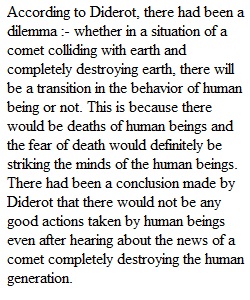


Q Discussion Board/HST1150 Attached Files: • Bloom County -- Human Nature, color original0001.pdf Bloom County -- Human Nature, color original0001.pdf - Alternative Formats (1.12 MB) One of the more persistent dilemmas of the legacy of the Enlightenment has been the implication and consequence of its ambiguity concerning the alleged 'goodness' of mankind. For example the concept of democracy assumes the goodness of mankind, but those devoted to an ideal of democracy in the first half of the 19th century would be termed/considered Romantics (identified by their opponents as irrational, emotional, feminine, and weak). In the supplemental readings for this week you will find a short reading concerned with this dilemma describing a discussion about human nature between the French philosophe Diderot and Falconet. Because it has a bearing on their positions, students should know that Diderot, whose education was paid for by the Catholic Church, in hopes that he would become a priest, was an atheist, and that Falconet, a member of what is termed "The Catholic Enlightenment" was a devout Christian. Restrained to the usual 500words or less, what do you think of Diderot's dilemma, and how he resolves it. Just in passing, it is frequently noted that the difference between a problem and a dilemma, is that a problem has a general solution, while a dilemma has only a personal one. Also available in the readings for this week is a selection on the "Scottish Enlightenment" examining the historical circumstances surrounding the the 'Edinburgh School's' adoption of the phrase 'the pursuit of happiness'. Though that reading is not required, considering how iconic this phrasing has been as an expression of America's 'declared' intentions, an excerpt from that reading about David Hume has been made available (required reading), and students are asked to present a short comment on their reaction to Hume's identification of happiness as a substantive expression of citizenship in the context of the Diderot/Falconet dialogue. Finally, with reference to the same dilemma, comment on the expectations of the framers of the Constitution with regard to human nature and its implications for happiness evident in McDonald's Novus Ordo Seclorum. Decades ago, in my Basic College courses, I included the attached "Bloom County" cartoon as a part of a larger question involving the Falconet and Diderot, and the dilemma of perceived human nature in the thought and action of the Enlightenment. The comic strip has, itself, been a part of history, sadly, for a very long time as well; however, about three years ago now, its creator Berke Breathed started a new series of the strip on-line -- apparently encouraged(?) by the Donald Trump candidacy: so, just in case you might be interested!? For those of you unfamiliar with the strip, which is likely all of you by now, the Portnoy character is a Ground Hog. Some of you may have seen the movie "Secondhand Lions" (2003) with Robert Duvall and Michael Caine for which Breathed had provided the comic strip.
View Related Questions